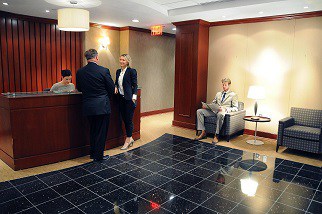A virtual office can present a variety of options. What should you be looking for in your virtual office provider?
A virtual office. What is up with that?
A virtual office rental arrangement is a financial arrangement where solo and small firm attorneys pay a low monthly fee (typically starting at under $149 month) to rent the use of a premium commercial address in an executive office suite and the non-exclusive use of office space and amenities, such as conference room facilities, a staffed reception area and access to law firm grade telecommunications and office equipment.
Where can one find a virtual office?

Virtual offices typically come as package deals and at a much lower price than a physical office agreement. Common elements of a virtual package are use of a commercial address and collecting and forwarding of incoming mail. Sometimes these packages will include conference room and day office time each month.
The centers are generally professionally operated and well-appointed. Take time to find a space that best suits your needs.
The top things to consider when choosing a virtual office provider.
1. Price.

Prices range for these additional amenities from $10 and hour to use the conference room to upwards of $200 in large metropolitan centers like New York and San Francisco. The local market typically dictates the pricing of these centers.
2. Location.
Paying attention to your travel patterns is a wise strategy in choosing your center location. You may need to take into account the needs of your clients in addition to your needs. Perhaps a center close to an airport where you or your clients can get to and from with ease would bode well in the selection of your virtual office.
Even taking into account a city’s transportation system and the hot spots will help one make a better decision in selecting a virtual office.
3. Amenities.
Having the space and amenities to meet your needs is crucial in a virtual office arrangement. Such amenities can be conference room time, which office centers sometimes skimp on and make it difficult to reserve any time.
In addition to lack of conference room time, pricing for time can cost more depending on the size of the room. It may be more viable to consider renting elsewhere, especially when the center only has one or two room options.
4. Onsite staff.

It is important to cover your behind, so always make sure there is adequate staffing during regular business hours. Some centers have very poor reception patterns. The front desk may be left unattended for long periods of time which does not look good for you when a client is coming in to meet you. Even worse, the front desk may be occupied by someone who is just wildly incompetent.
5. Environment and Business Culture.
Business culture is necessary to understand and each office center has a particular working environment dictated by the center’s clientele. Law Firm Suites caters to attorneys, therefore, it feels like a fully functioning law office. With office centers that have closed doors and a subdued and professional vibe, it leads to the feeling of productivity.
On the other hand, our colleagues at Sunshine Suites, another executive office center in downtown Manhattan, rent virtual offices and office space to start-up companies, mostly in technology. They rent open air, modular spaces that give their clients’ rapidly changing businesses the flexibility to easily grow and contract as needed. Without closed workspaces, there’s a noisy buzz in Sunshine Suites’ center that their core clientele finds inspiring and motivating.
Lawyers and technology start-up companies have different business cultures. Techie professionals would likely find a NYC shared law office space boring, and attorneys would likely be annoyed by a lack a lack of privacy found in technology specific coworking centers.
Your clients and colleagues have an expectation about what your office space will be like. They expect that they will be meeting you in a law office. Make sure the office center where you are renting your meeting space is consistent with your clients’ expectations. An office center with a high percentage of attorneys (or one that is exclusive to attorneys) is your best bet.


